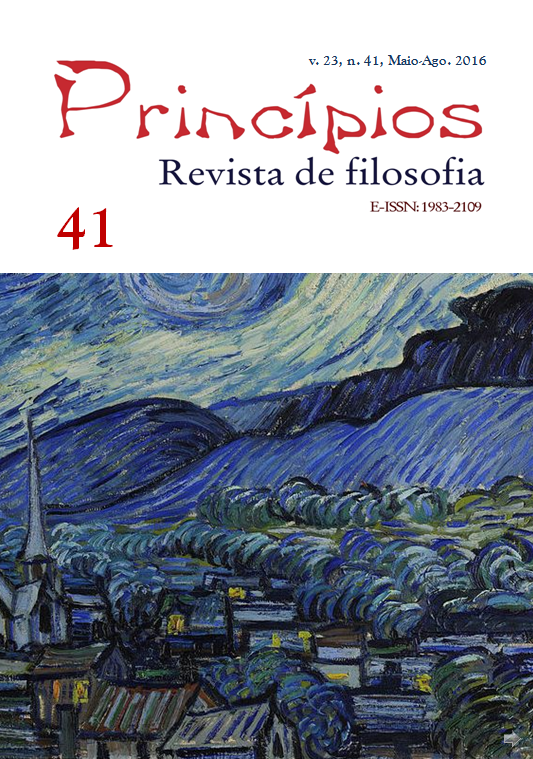Is there a human right to be assisted in dying? [Temos um direito humano a ser assistido na morte?]
DOI:
https://doi.org/10.21680/1983-2109.2016v23n41ID9834Palavras-chave:
Human rights, Right to assisted dying, Human dignity, Autonomy, LibertyResumo
This paper will focus on the issue of whether it is plausible to think about a human right to be assisted in dying. The right to be assisted in dying cannot be considered just a right of non-interference. It is better understood as a claim right because it demands assistance and positive actions. I will argue that the principles of individual autonomy and Kant’s notion of dignity taken independently cannot be considered plausible justification for the human right to be assisted in dying. Griffin’s personhood account points out that principles of liberty, minimum provision and autonomy must be taken together to justify human rights. Based on his theory, I will argue that a person with a terminal disease who was aware of her imminent death or who suffered from an intractable, incurable, irreversible disease may waive the right to life and choose death. Therefore, the right to life would not restrict the human right to be assisted in dying and a state that allowed the practice of assisted dying would not be disrespecting the human right to life. This article will defend that the personhood account is able to protect vulnerable people from making decisions under pressure and avoid the slippery slope objection.Downloads
Referências
COHEN-ALMAGOR, Raphael. The human right to assisted dying with dignity: an argument in Ethics and Law. Health Law & Policy. Spring 2008, p. 2-8.
CRISP, Roger. (Ed.). Griffin on Human Rights. Oxford: Oxford University Press, 2014.
DIGNITY IN DYING, Campaign for. 2015. Avaiable on:
< http://www.dignityindying.org.uk/about-us >. Accessed on: June 12, 2016.
FEINBERG, J. Voluntary euthanasia and the inalienable right to life, Philosophy and Public Affairs. v. 7, n. 2, Winter 1978, p. 93-123.
GRIFFIN, James. On Human Rights. Oxford: Oxford University Press, 2008.
HEHIR, Davina; SATHERLEY, Philip. Assisted dying around the world today. In: CLOSE, Lesley; CARTWRITGHT, Jo. (Ed.). Assisted dying: who makes the final decision. London: P. Owen, 2014. p. 105-122.
HILL, T. Humanity as an end in itself. Ethics. v. 91, n. 1, Oct. 1980, p. 84-99.
KANT, I. The Cambridge edition of the works of Immanuel Kant: practical philosophy. Cambridge: Cambridge University Press, 1996.
KASS, Leon R. Is there a right to die? The Hastings Center Report. v. 23, n. 1, Jan.-Feb. 1993, p. 34-43.
MANSON, N. C.; O’NEILL, O. Rethinking informed consent in Bioethics. Cambridge: Cambridge University Press, 2007.
MERTENS, T. Kant and the ends of life. In: DALL’ AGNOL, Darlei; TONETTO, Milene Consenso. (Ed.). Morality and Life: Kantian Perspectives in Bioethics. 1. ed. Pisa: Edizione ETS, 2015.
MILL, J. S. On liberty and other writings. Cambridge: Cambridge University Press, 1989.
NICKEL, James. Making sense of Human Rights. Oxford: Blackwell, 2007.
NICKEL, James. Human Rights. In: ZALTA, Edward N. (Ed.). The Stanford Encyclopedia of Philosophy. Winter 2014 Edition. Avaiable on: <http://plato.stanford.edu/archives/win2014/entries/rights-human/>. Accessed on: June 12, 2016.
O’NEILL, O. Autonomy and trust in Bioethics. Cambridge: Cambridge University Press, 2002.
OREGON HEALTH AUTHORITY. Death with dignity Act. 1997. Avaiable on: < https://public.health.oregon.gov/ProviderPartnerResources/ EvaluationResearch/DeathwithDignityAct/Pages/index.aspx >. Accessed on: June 12, 2016
SENSEN, O. Kant’s conception of human dignity. Kant-Studien – Philosophische Zeitschrift der Kant-Gesellschaft. v. 100, n. 3, Jan. 2009, p. 309-331.
TALLIS, Ray. The right to an assisted death. In: CLOSE, Lesley; CARTWRITGHT, Jo. (Ed.). Assisted dying: who makes the final decision. London: P. Owen, 2014.
TONETTO, M. C. Dignidade e direitos em Kant. Kant e-Prints (Online). Série 2, v. 9, n. 1, jan.-jun. 2014, p. 42-53.
Downloads
Publicado
Como Citar
Edição
Seção
Licença
Autores mantêm os direitos autorais e concedem à revista o direito de primeira publicação, com o trabalho simultaneamente licenciado sob a Licença Creative Commons Attribution que permite o compartilhamento do trabalho com reconhecimento da autoria e publicação inicial nesta revista.
Termos da licença:
| Não Comercial (NC) | Os licenciados podem copiar, distribuir, exibir e executar a obra e fazer trabalhos derivados dela, desde que sejam para fins não comerciais. |
| Compartilha Igual (SA) | Os licenciados devem distribuir obras derivadas somente sob uma licença idêntica à que governa a obra original ou menos restritiva. |


 Português (Brasil)
Português (Brasil) English
English Español (España)
Español (España) Français (Canada)
Français (Canada)


